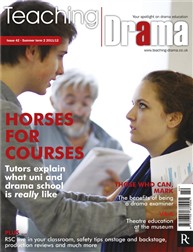Guide to Plays for Performance: new supplement out now!
The new supplement to our Guide to Plays for Performance is available now to download FREE from this site.
Containing cast details, plot synopses and extracts from our latest plays for performance by amateur performance - including Shared Experience's Mary Shelley, the National Theatre's The Last of the Haussmans, Ella Hickson's Boys and a new version of The Wind in the Willows - it's an essential resource for any schools or amateur companies looking for something fresh to perform.
Visit our Guide to Plays for Performance page to download the supplement now. You can also download previous supplements and the main Guide from the same page.
Lastly, make sure you sign up here to receive future supplements as soon as they're released.
Tamara von Werthern, Performing Rights Manager

Clybourne Park and Once triumph at Tony Awards
Clybourne Park, Bruce Norris's stingingly satirical play about race relations in a Chicago neighbourhood, was named Best Play at the Tony Awards last night (10 June) at the star-studded ceremony at the Beacon Theatre in New York.
The play, which was published by Nick Hern Books alongside its UK premiere at the Royal Court Theatre in London in September 2010, has already picked up a plethora of awards including the Critics Circle Award and Olivier Award for Best New Play, and the Evening Standard Award for Best Play.
The Tony Award for Best Musical was awarded to Once, the new musical written by NHB playwright Enda Walsh, which was the runaway success of the night, picking up a total of eight awards. It is now tipped for West End transfer.
Success at the Tony Awards caps a brilliant few weeks for NHB playwrights in the US after Nina Raine's Tribes won the New York Drama Critics Circle Award for Best Foreign Play as well as Best Play at the Drama Desk Awards.
Tom Wells wins George Devine Award for The Kitchen Sink
The 2012 George Devine Award for Most Promising Playwright has been won by Tom Wells for his play The Kitchen Sink, it was announced today (29 May) at the Royal Court Theatre.
The play, which premiered at the Bush Theatre, London, in November 2011, has already won its author the Critics' Circle Award for Most Promising Playwright. The Kitchen Sink was described by Charles Spencer of the Daily Telegraph as 'one of the best new plays I have seen anywhere this year, and I cannot recommend it too highly.'
The George Devine award is an annual award for new writing in theatre. Coming with a prize of £10,000, it is open to any playwright in the UK for an original stage play, which need not have been produced. It was set up in 1966 as a memorial to the life and talent of the founding Artistic Director of the Royal Court, George Devine.
Previous winners of the George Devine Award include Edward Bond, Mike Leigh, Hanif Kureishi, Martin McDonagh, Conor McPherson, Enda Walsh, Gary Mitchell, Richard Bean, Mark O’Rowe, Lucy Prebble, Alexandra Wood and Vivenne Franzmann.
debbie tucker green and Jack Thorne win Bafta TV Awards
random, debbie tucker green's poetic film about youth violence for Channel 4, adapted from her Royal Court play of the same name, took the Bafta for single drama at the British Academy Television Awards last night. The playscript is published by Nick Hern Books.
The Bafta for Best Drama Series went to The Fades, written by Jack Thorne, who also picked up a Bafta for Best Mini Series for This Is England '88, co-written by Thorne and Shane Meadows. Jack Thorne's plays, including Bunny, 2nd May 1997 and When You Cure Me, are all published by Nick Hern Books.
Plays to Perform site recommended for teachers
Teaching Drama magazine says our Plays to Perform site is 'really useful and easy to use', and recommends it for all teachers and lecturers looking for a play to perform.
'A simple, elegant, searchable database that does exactly what it says on the tin and accompanied by well-written notes... Nick Hern Books has an exciting play catalogue and, from the look and feel of this site, actively wants to encourage teachers, lecturers and students to breathe life into their scripts.'
Teaching Drama is published by Rhinegold and is available here.

News on Love, Love, Love by Mike Bartlett
We are delighted to announce that we have cleared the right to perform Love, Love, Love with a cast of 5f 6m instead of the professional cast of 2f 3m, allowing you to cast the two protaganists according to their age.
As you can see from the review below the fact that the actors at present have to play convincing 19 year olds aging all the way through to 64 is the only niggle in an otherwise excellent review of the production.
So you have the chance of improving on that with your casting! Please enquire before rehearsals start, as the play will be restricted until the end of the professional run.
LOVE LOVE LOVE
reviewed by Charles Spencer for The Daily Telegraph
Wow, this one packs a punch. In a theatre famous for encouraging angry young men, Mike Bartlett, a writer in his early thirties, lands some knock-out blows on the complacency and selfishness of the have-it-all baby- boomer generation.
First seen on tour in 2010, and now revived by the Court in a thrilling high voltage co-production with Paines Plough, this is a play that has you laughing uproariously at one moment and wincing painfully the next.
Compared with Bartlett’s big, baggy state of the nation dramas at the NT, this is a chamber piece, with just five characters. But it strikes me as Bartlett’s best work to date, with deeper characterisation, more personal themes, and scenes of extraordinary intensity and emotional truth shot through with dark humour.
The action begins in 1967, during that fabled Summer of Love when the world seemed to turn from dreary black and white into a hippy-dippy Technicolor dream.
Sandra, a sexy, predatory Oxford undergraduate, high on dope, is meant to be having a date with Henry, a strait-laced 23 year old. But she promptly sets about seducing his younger brother, Kenneth, also 19 and at Oxford, and in the two subsequent acts we catch up with them in 1990, when they are married yuppies living in Reading with two teenage children of their own, and in 2011 when they are prosperously retired, amicably divorced and their children are in their thirties.
There are some jolting dramatic surprises as we follow the characters through more than 40 years, and Bartlett proves a stern and powerful moralist. His play insists that the soppy, sloppy self-indulgent values of the Sixties were often deeply selfish – it is significant that Kenneth and Sandra’s relationship began with an act of betrayal – and also suggests that that many of those who embraced the Sixties dream never fully grew up. The dramatist is also articulately indignant on behalf of the children of the baby boomers, who will never enjoy the easy lives and wealth of their feckless parents in these hard economic times.
The one problem that director James Grieve’s powerful, evocative and elegantly designed production can’t entirely solve is having the same actors, Ben Miles and Victoria Hamilton, playing the two main characters from their late teens to their 60s. Their acting is so excellent that it is usually possible to suspend disbelief, though the most powerful of the three acts is undoubtedly the middle one showing the couple breaking up in middle-age before the appalled gaze of their children. Significantly, it’s the one scene when the performers actually are about the same age as the characters they are playing.
Victoria Hamilton brilliantly manages to be both beguiling and vile as the hard-drinking, crassly insensitive Sandra, and there is equally fine work from Ben Miles as her husband, who seems superficially nicer but is actually equally selfish and complacent.
There are also haunting, heart-wrenching performances from Claire Foy and George Rainsford as their damaged children, and one leaves the theatre in no doubt that the Court has another timely, hard-hitting success on its hands.



